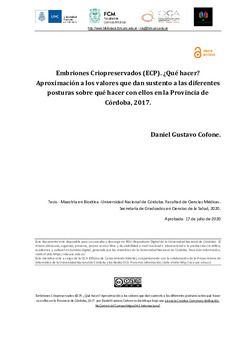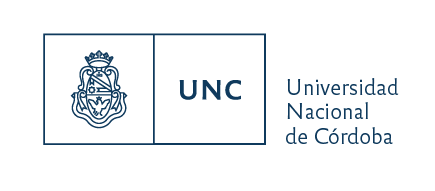| dc.contributor.advisor | Villalonga, María Inés | |
| dc.contributor.author | Cofone, Daniel Gustavo | |
| dc.date.accessioned | 2021-05-21T13:50:13Z | |
| dc.date.issued | 2020-07-17 | |
| dc.identifier.uri | http://hdl.handle.net/11086/18385 | |
| dc.description | Tesis - Maestría en Bioética -Universidad Nacional de Córdoba. Facultad de Ciencias Médicas. Secretaría de Graduados en Ciencias de la Salud, 2020 | es |
| dc.description.abstract | Temas como los relacionados al inicio y al fin de la vida han sido persistentes en la discusión bioética por años. La discusión sobre el destino de los Embriones Crio Preservados (ECP), tan íntimamente ligada a la discusión acerca del origen de la persona humana, requiere de un análisis para poder evaluar los valores que deben sustentar las diferentes posturas sobre qué hacer con ellos. Con éste fin se llevó a cabo una encuesta en la Provincia de Córdoba en la que se incluyeron 533 participantes: 494 ciudadanos comunes y 39 Legisladores, para poder evaluar si el pensamiento de los primeros se encuentra representado por el de éstos últimos. También se indagó sobre la influencia que podrían tener diferentes características socio demográficas como edad, sexo, condición sexual, prácticas religiosas, profesión, haber transitado una situación de embarazo y tenencia de hijos. Se concluyó que todas las variables analizadas coincidieron que la donación de embriones para otras parejas era la opción más adecuada, dejando de manifiesto que el altruismo prevalece ante todas las otras posturas (egoístas y utilitaristas). Un dato interesante fue concluir que existe una incoherencia conceptual entre la asignación del estatus de persona al ECP y al embrión como partícipe del proceso del embarazo. La relación afectiva superó ampliamente a las otras opciones propuestas a la hora de emprender un proyecto de descendencia, principalmente por parte de hombres jóvenes, homosexuales, participantes activos de alguna religión sin hijos. Finalmente, se comprobó que el pensamiento de los legisladores es coincidente con el de los ciudadanos comunes. | es |
| dc.description.abstract | Topics related to the beginning and ending of life, have been persistent for years in the bioethics discussion. The discussion about the Crio Preserved Embryos (CPE) so tightly joined to the discussion about the origin of the human person needs a sound analysis for the sake of evaluating the values that ought to support the different positions about their destiny. With that object an inquiry was held in the Province of Córdoba, where 533 participants: 494 common citizens and 39 Members of the Congress were involved to know if the thoughts of the first ones, are represented by the last ones. Influences like age, sex, sexual condition, religion, profession, were investigated, as well as the ones who had lived a situation of pregnancy and parenthood. As a conclusion, it was evident that the gift of embryos to other couples was the best option, showing that unselfishness prevails over all the other positions (selfish and utilitarianism) A very interesting point was to learn that a conceptual incoherence exists between the assignment of the personal status to CPE and the embryo as part of the process of pregnancy. The affective relation surpassed widely the other proposals at the time of beginning a project of descent, particularly among young men, homosexuals, active participants of some religion and the ones without children. Finally it was shown that the thoughts of the Congress Participants are equal to the ones of the common citizens. | en |
| dc.language.iso | spa | es |
| dc.rights | Atribución-NoComercial-CompartirIgual 4.0 Internacional | * |
| dc.rights.uri | http://creativecommons.org/licenses/by-nc-sa/4.0/ | * |
| dc.subject | Discusiones bioéticas | es |
| dc.subject | Criopreservación | es |
| dc.subject | Estructuras embrionarias | es |
| dc.subject | Fertilización | es |
| dc.title | Embriones Criopreservados (ECP) ¿Qué hacer?: aproximación a los valores que dan sustento a las diferentes posturas sobre qué hacer con ellos en la Provincia de Córdoba, 2017 | es |
| dc.type | masterThesis | es |
| dc.description.embargo | 2022-07-17 | |
| dc.description.fil | Fil: Cofone, Daniel Gustavo. Universidad Nacional de Córdoba. Facultad de Ciencias Médicas.
Secretaría de Graduados en Ciencias de la Salud; Argentina. | es |





